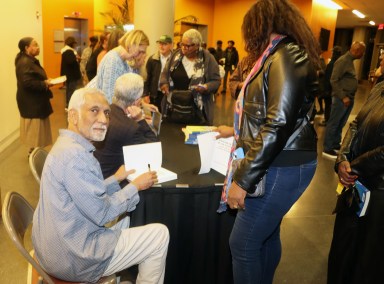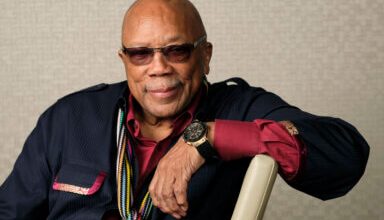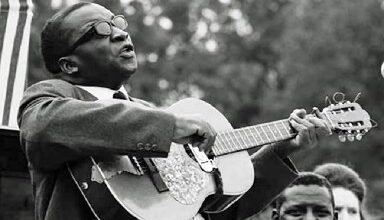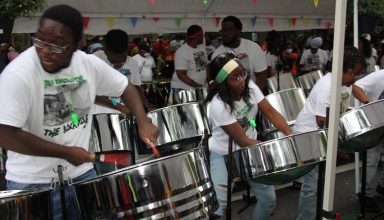Frankie McIntosh co-authors ‘The Art of the Soca Arranger’ with Prof. Ray Allen

Pre-eminent Caribbean calypso-soca arranger Frankie McIntosh and Ray Allen, professor emeritus of music and American studies at Brooklyn College, City University of New York (CUNY), on Sunday, released their book, “Frankie McIntosh and the Art of the Soca Arranger,” during a book-signing ceremony and Steel Pan Jazz Performance at the Don Buchwald Theater and Tow Atrium, Brooklyn College.
Several calypso-soca fans, music lovers, and book lovers were on hand to witness the ceremony and purchase the book, which has already garnered rave reviews.
The book-signing ceremony was preceded by a discussion on the book by Vincentian-born McIntosh and Allen, hosted by Trinidadian broadcaster Eric St. Bernard.
It was followed by the Steel Pan Jazz Performance, with McIntosh on piano; Trinidadians Gavin Blake on steel pan and Dean James on drums; Guyanese Max Gouveia on bass; and Jamaican Charles Dougherty on saxophone.
The ensemble performed Becket’s “St. Vincent My Homeland,” “Caravan,” “Afraid” by Sparrow, “No Money, No Love,” and “Nica’s Dream.”
During the discussion segment, Allen said that the COVID-19 pandemic was “good for the book because Frankie was home, and I was home.
“It’s a very immigrant story,” he said, adding that “the second half of the book is about the calypso that he (McIntosh) arranged.”
The authors said: “‘Frankie McIntosh and the Art of the Soca Arranger’ tells a story of Caribbean music in the Diaspora through the eyes and ears of a pioneering Soca arranger.”
They said the co-written memoir “places the music arranger at the center of several overlapping narratives of immigration and musical Diaspora.”
The authors noted that the book begins with McIntosh’s personal voyage from St. Vincent and the Grenadines to Brooklyn and his efforts to “hammer out a career in music while raising a family in his newly adopted home.”
According to the book, McIntosh’s immigrant tale is “intertwined with his musical journey, from popular Caribbean dance bands through formal studies in Western classical music and jazz to his work as a gigging jazz pianist and calypso/soca arranger.
“Along the way, he embraced the varied music of New York’s African American and West Indian communities, working with such iconic calypsonians as the Mighty Sparrow, Lord Kitchener, Calypso Rose, and Alston ‘Becket’ Cyrus,” according to the back cover.
It says McIntosh’s story provides “a unique lens for viewing Brooklyn Carnival music and focuses on the borough’s rise to prominence as the transnational hub of the soca music industry in the 1980s.
“An alternative to traditional scholarship that tends to focus on calypso and soca singers, this work explores the instrumental dimensions of the art form through the life and music of one of the most celebrated soca arrangers and keyboardists of all time,” it added.
“Frankie McIntosh and the Art of the Soca Arranger” notes that soca music, an offspring of older Trinidadian calypso, “emerged in the late 1970s and is now recognized as one of the English-speaking Caribbean’s most distinctive styles of popular vocal music.”
It says the “fascinating collaboration between Frankie McIntosh and music scholar Ray Allen places the music arranger at the center of several overlapping narratives of immigration and musical Diaspora.”
In the acknowledgments, the authors said, “The past four years have flown by as this book project moved from a nascent idea to a final published work.”
They said that “many colleagues and friends have contributed along the way,” with “Frankie’s circle of musicians associates” offering their insights.
In her review, Jocelyne Guilbault, coauthor of “Roy Cape: A Life on the Calypso and Soca Bandstand,” writes: “Frankie McIntosh and the Art of the Soca Arranger is a path breaking contribution to the scholarly literature on Caribbean popular music and the first serious publication on the journey of a West Indian arranger in Diaspora.
“In their exchange, Frankie McIntosh and Ray Allen provide a unique account of not only the African Diasporic sonic and human interconnections that animate Frankie McIntosh’s musical life and thinking,” she writes. “It reveals the labor of an arranger and the arranger’s sheer joy in exploring what a melody can become.
“This book also speaks volumes about how the production of popular music emerges out of a complex negotiation between the arranger’s personal taste, public expectations, and economic considerations,” Guilbault added.
Kyle DeCoste, coauthor of “Can’t Be Faded: Twenty Years in the New Orleans Brass Band Game,” also writes, “Illuminating the mechanics of some of the biggest soca hits from the 1960s into the 21st. Century, ‘Frankie McIntosh and the Art of the Soca Arranger’ is an exceptional collaboration and a steadfast listening companion for anyone craving a more profound knowledge of the music and the work behind its creation.
Vincentians show their support for Frankie McIntosh at the book-signing ceremony. Photo by Nelson A. King
The book says that McIntosh is “recognized internationally as one of the architects of the famous West Indian soca style that emerged in the late 1970s.
“A pianist and music arranger, he served as music director for Brooklyn-based Straker’s Records for three decades,” it says. “During that time, he composed musical arrangements and oversaw the recordings of close to 1,000 calypso/soca albums for Straker and other Brooklyn-based calypso labels.
“He recently was awarded an Honorary Doctorate from the University of the West Indies,” it added.
The book also says that Allen was a senior research associate at the Hitchcock Institute for the Study of American Music.
It says his books include “Singing in the Spirit: African-American Sacred Quartets in New York City”; “Gone to the Country: The New Lost City Ramblers and the Urban Folk Music Revival”; “Island Sounds in the Global City: Caribbean Popular Music and Identity in New York,” coedited with Lois Wilcken; and “Jump Up! Caribbean Carnival Music in New York City.”
When the University of the West Indies (UWI) conferred an honorary Doctor of Letters (D. Litt), honoris causa, on McIntosh in December 2020, it said he “genetically held the key to many musical genres.”
UWI said McIntosh’s grandfather was a gifted musician, “a talent he bequeathed – via nurture and nature – to Frankie’s father and his father’s siblings.”
It said McIntosh’s mother, “a nurse up to his fifth birthday, was the archetypical disciplinarian, loving and caring, but also adept with the belt – which, by his own account, was a motivating factor for attending music lessons, not to mention his crestfallen music teacher who, not having seen him at music lessons for a couple months complained to his mother that Frankie’s truancy was putting her out of pocket – a matter which his mother resolved posthaste with the microeconomic intervention of the tamarind whip.
“We owe Frankie a debt of gratitude for having brought so much talent to the fore, evinced, for instance, by the myriad times he was musical arranger, keyboardist, technical producer, pianist, music software programmer, and conductor for some of the most prominent calypsonians such as Alston ‘Becket’ Cyrus; The Mighty Sparrow; Explainer; Calypso Rose; Obstinate; Short Shirt; Shadow; Swallow; Lord Kitchener; Crazy; Winston Soso; Duke; and others,” UWI said.
It noted that one of McIntosh’s arrangements, Becket’s “Calypso Disco,” became the soundtrack of the movie “The Deep.”
UWI also said that Chalkdust’s 1989 Calypso Monarch-winning mellifluous “Chauffer Wanted,” another classic musical arrangement by McIntosh, underscored the brilliance and versatility of this Vincentian and Caribbean virtuoso.
“What is amazing, nay, beguiling, is not only his musical genius, but his courage and ability to maintain a ‘professional’ disposition and straight face while arranging Winston Soso’s ‘How Some Men Love They Women’; or Mighty Swallow’s ‘Fire in the Back Seat’ and ‘The Man with the Pepper Sauce is Boss’; or Becket’s ‘Teaser’ and ‘Coming Higher’; and, indeed, The Mighty Sparrow’s ‘Don’t Back Back on me,’” UWI said.
It said that McIntosh is a classically-trained Jazz musician with a BA in music from Brooklyn College, an MA in Jazz Performance from the New York University (NYU) School of Education, and a licensed teacher from the NYC Board of Education.
UWI said McIntosh has made an “indestructible mark on authentic Caribbean music and, ipso facto, bona fide Caribbean culture.
“He was not constrained by nationality or other parochial interests in the deployment of his talent,” it said. “With a totally Pan-Caribbean and Diasporic sensitivity, he found the time for teaching and assisting younger performers, arrangers and musicians, not just the big popular names.”
McIntosh’s mentors and teachers were world-renowned and iconic, like John Lewis of the Modern Jazz Quartet; Zenon Fishbein, a Chopin proponent; and Robert Starer, a noted US composer.
He was a member of the traveling group “The Wonderful World of Charlie Brown and Yvonne and backed up groups such as The Shirelles, Jay and the Americans, The Platters, and Inkspots, among others.
McIntosh’s arrangement of “Betcha by Golly Wow fame” caught the attention of the legendary Phyllis Hyman, who later recorded her own version.
“Frankie McIntosh and the Art of the Soca Arranger” is published by the University Press of Mississippi (Nov. 15, 2024).





